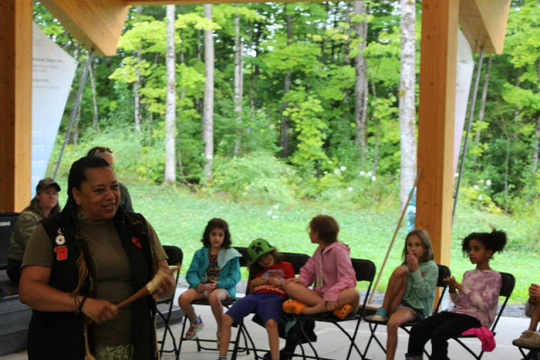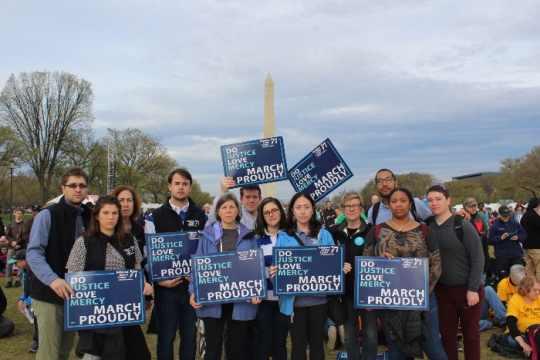
If you looked around you at Rosh HaShanah services – and do so again tomorrow, Yom Kippur, my bet is few young adults were – or will be – present. True, some live far away or couldn’t miss school or work, while others simply don’t connect with the religious ritual of the High Holidays.
Does anyone besides me worry that when we’re gone these pews will be empty? I know I’m not alone. In fact, I’m amazed by how much time contemporary Jewish leaders spend worrying about the next generation. But worrying isn’t a strategy.
Instead, think about what you heard in synagogue during the reading of one of our most famous biblical stories, the Akeidah or the “Binding of Isaac.”
Most of us imagine that in the Genesis narrative, Isaac is a little boy, docile to a fault. But what if Isaac is a young adult? There’s a lot of debate among the traditional biblical commentators as to just how old Isaac is at the time of the Akeidah. By cross referencing the Torah’s narratives, Isaac is somewhere between five and 37. The latter is when young people either forge a serious connection to Jewish life or begin to drift away.
The Torah texts tells us twice: “Vayeil’chu sh’neihem yachdav. (And the two walked together.)”
At what point should Abraham have talked through the sacred outing with his young adult son? He couldn’t have leveled completely, even with his 20- or 30-something son, right? “Hey, Izzy, what do you think about a nice hike to Mt. Moriah so I can offer you up as a human sacrifice?”
But could he have said this: “Izzy, I’m struggling, even confused. What do you think we should do when God makes impossible demands of us?”
At what point should Abraham have realized he had to stop calling all the shots and instead invite his son to shape the Jewish future with him?
Isn’t another takeaway from the Binding of Isaac the danger of religious zealotry? Would you blame Isaac if after the Akeidah he told his parents he wanted none of their fanatic religion that could contemplate – let alone command – child sacrifice. If that’s what being religious is all about, most of us also would say “No thanks.”
Today, too many millennials want no part of religious institutions because they associate being religious with intolerant fundamentalism, opposition to reproductive choice, demonization of the LGBTQ community, and rejection of science and modern thought.
So, should we give up on millennials and Jewish life? Hardly.
But, figuring out their role in Jewish life isn’t something we can do for them, so let’s agree to follow the dictum “nothing about them without them.”
Millennials are committed to lives of purpose and depth. They volunteer at higher rates than people in other generations and an overwhelming majority of them believe in treating all people with respect, regardless of race, gender, religion, political viewpoint, or sexual orientation. Their experiences and beliefs are aligned with the substance of our Jewish tradition.
In the immediate aftermath of the horrific mass shooting in Parkland, Florida, many of the students fled the campus to our remarkable Reform congregations, Kol Tikvah and Temple Beth Orr, where they knew they would be safe with their rabbis. They saw first-hand the power of a real community of faith. Two days later, with help from our Religious Action Center of Reform Judaism in Washington, D.C., they followed their faith up to Tallahassee to demand action on gun violence prevention from their elected officials.
An inspired Reform teen leader, Zoe Terner, the social action vice president of NFTY: The Reform Jewish Youth Movement, joined Parkland students as they spoke hard truths to those in power. One state senator said they should go back to Parkland, take care of each other, do their homework, and leave public policy to the professionals, adding, “there’s no point in banning assault weapons because the wrong people will always be able to get them.”
“If I may, Senator?” Zoe asked. “There’s a saying in Judaism: Lo alecha ha’mlacha ligmor –You are not obligated to complete the work, but neither are you free to desist from it. It’s true that this piece of legislation isn’t a total solution, and it’s true that we have so much work left to do. But, Senator, this is a step. This is a beginning. We are determined to do something, anything, that will save just one life. And then we will keep going – until we have saved them all.”
These modern day Isaacs aren’t tomorrow’s leaders, they are already taking the lead.
Indeed, many of our millennials are finding places and ways to grow their connection to Jewish community and teachings. Within our Reform network, more than 40 congregations – from San Francisco to Memphis, Chicago to Washington D.C., Dallas to Boston – regularly offer creative, meaningful, and targeted outreach to millennials. Nonetheless, there is always room for additional options, which is why the URJ is focusing energy and effort to build a larger, stronger network of young adult communities designed to meet the unique needs of the people in this important cohort.
The Jewish future will not resemble the Jewish past, but if we’re smart and strategic, it will be bright. Let’s not get hung up if millennials don’t want to drive their own cars to the Jewish future, preferring instead to ride their bikes, walk, or take the subway or an Uber. The main thing is they follow their own path to shape the world that God calls us to create in partnership with the Holy One.
Have something to say about this post? Join the conversation in The Tent, the social network for congregational leaders of the Reform Movement. You can also tweet us or tell us how you feel on Facebook.
Related Posts

Not Just a Checkbox: Diversity, Equity, & Inclusion Actions at URJ Camp George

9 Things to Consider When Creating an Inclusive Security Plan

